Key takeaways:
- Feedback is an essential tool for growth in songwriting, providing valuable insights on emotional connection and lyrical depth.
- Different types of feedback—peer versus professional and emotional versus technical—can offer unique perspectives for improving music.
- Receiving feedback graciously involves remaining open-minded, managing emotions, and expressing gratitude to foster constructive relationships.
- Engaging with feedback through analysis and dialogue can lead to deeper reflections and innovative directions in songwriting.
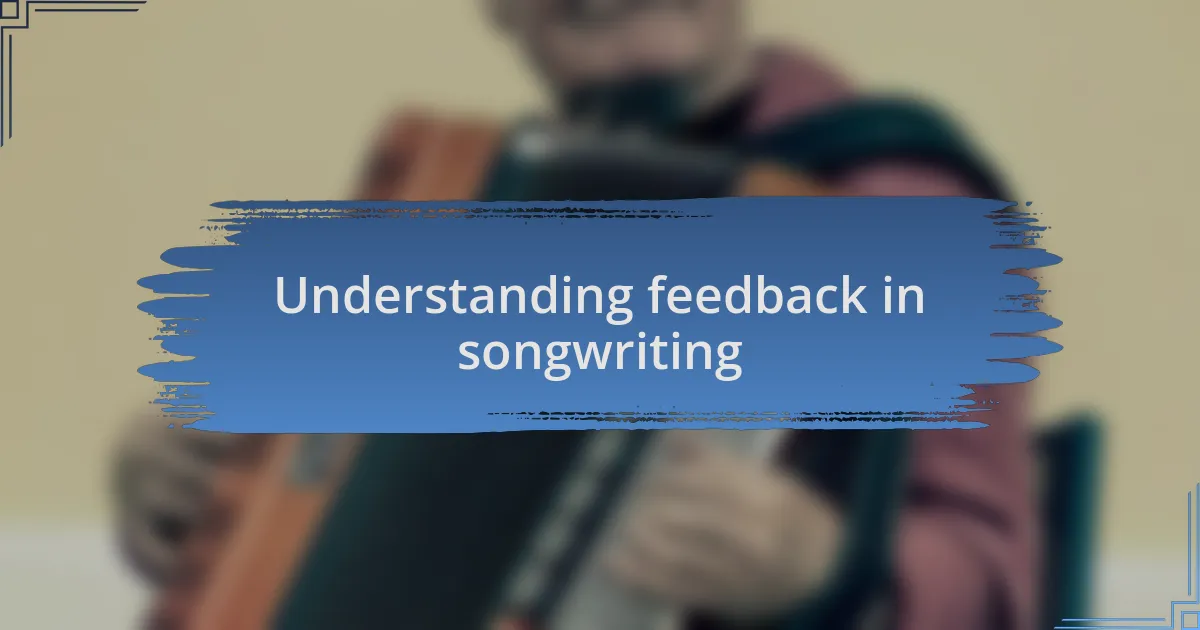
Understanding feedback in songwriting
When I first started sharing my songs, I was terrified of feedback. The thought of someone critiquing my heartfelt lyrics felt like exposing a part of my soul. But over time, I realized that feedback is not an attack; it’s an opportunity for growth. How else can we truly refine our craft if we don’t understand how our work resonates with others?
One unforgettable moment for me was when a seasoned songwriter told me to focus not just on the lyrics, but also on the emotions they evoke. This kind of constructive criticism reshaped my approach to songwriting. Have you ever noticed how certain songs stick with you? That’s because they connect emotionally, and understanding this can help you receive feedback more openly.
As you navigate the world of songwriting, remember that every piece of feedback adds a new layer to your artistry. It might sting at first, but consider it a compass guiding you toward stronger songs. Each suggestion or critique is like a stepping stone on your creative path; embracing them can transform your songwriting into a more impactful experience.
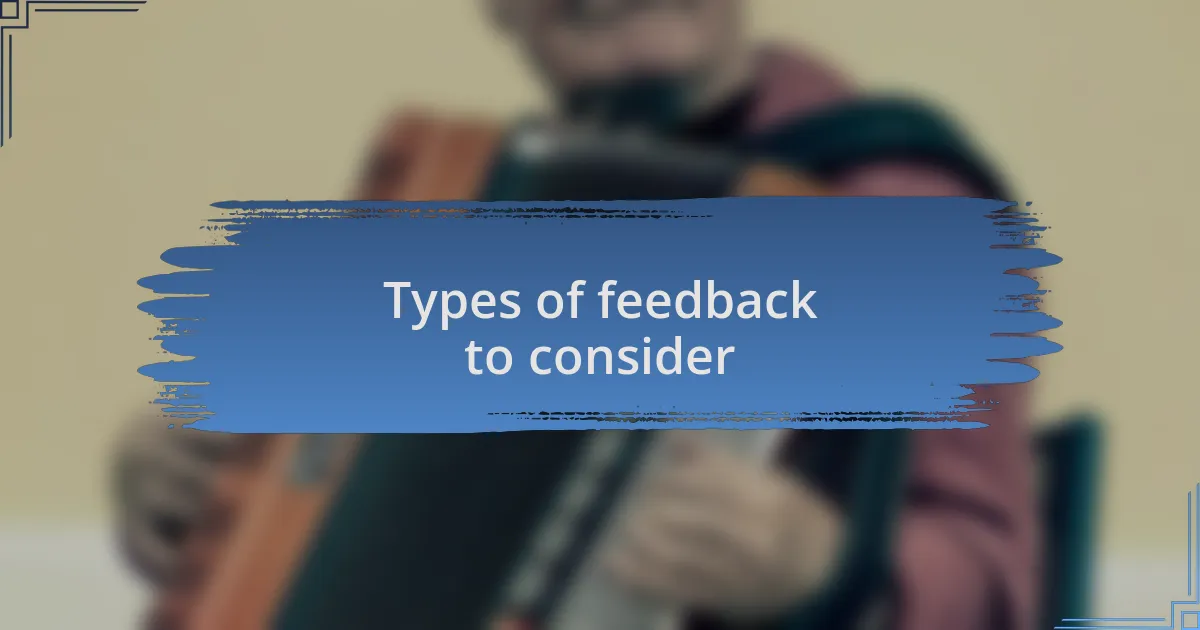
Types of feedback to consider
When considering feedback, it’s crucial to differentiate between various types. For example, I once received praise for a catchy chorus while being told the verses lacked depth. This duality helped me focus on balancing musicality with lyrical depth. Have you ever experienced feedback that felt contradictory? It can actually provide a fascinating opportunity to explore different aspects of your work.
Another type of feedback to consider is from your peers versus from industry professionals. I remember attending a songwriting workshop where fellow songwriters shared their perspectives on my work. Their insights felt relatable, but it wasn’t until I presented my song to an experienced producer that I encountered a more technical critique. This disparity highlighted how different audiences perceive music, offering me unique angles to improve and refine my songwriting.
Lastly, emotional feedback stands out as particularly insightful. I had a listener once share how a song made them feel vulnerable and understood. Their heartfelt response inspired me to consider how my lyrics connect with others on a deeper level. Have you ever thought about how powerful it is to touch someone’s heart with your words? This highlights the importance of feedback that focuses not just on technicalities but also on the emotional journey your music creates.
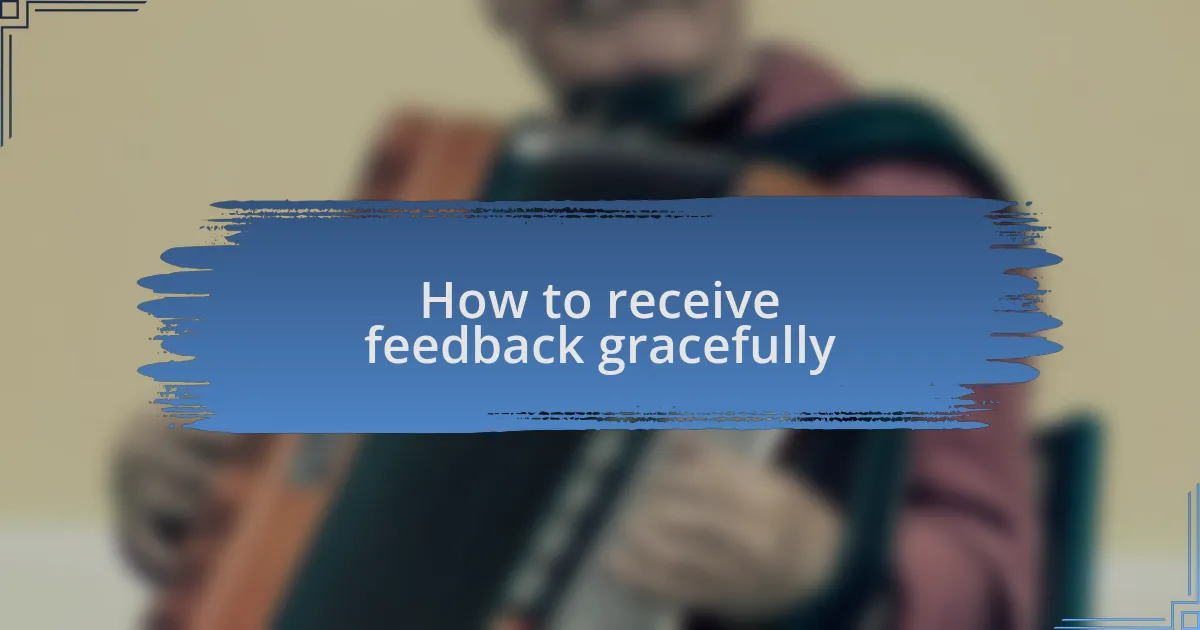
How to receive feedback gracefully
Receiving feedback gracefully starts with staying open-minded. I recall a time when a mentor pointed out the repetitive nature of my choruses. At first, it stung a bit, but I realized their insights could lead to more engaging hooks. Doesn’t it feel rewarding when you take criticism and transform it into something even better?
Emotions often run high when we share our creative work, so it’s essential to remain calm. I once shared a draft with a close friend who didn’t hold back her opinions. While her honesty initially dampened my spirits, I took a breath and focused on her suggestions, ultimately reshaping the song in a way that made it shine brighter. How do you manage your feelings when someone critiques your most cherished creations?
Lastly, I find that expressing gratitude after receiving feedback can make a world of difference. After a songwriting session, I always thank my collaborators for their thoughts, regardless of whether they are glowing or critical. This simple act not only nurtures relationships but also fosters a constructive atmosphere for future discussions. Have you noticed how positivity can transform the feedback experience into a more collaborative journey?

Analyzing feedback for growth
Analyzing feedback effectively requires a keen eye and an open heart. There was a time when I received detailed notes from a songwriting workshop, and instead of skimming them, I took the time to dissect each point. By categorizing the feedback into strengths and areas for improvement, I could focus my energy where it would matter most—essentially turning raw critiques into clear, actionable steps.
I often wonder about the underlying emotions behind certain critiques. For instance, I once received feedback that suggested my lyrics were too abstract. Initially, it felt like a personal attack, but then I recognized that it was a call for clarity. This realization motivated me to dig deeper into my own work, grappling with how I could express complex themes in a more relatable way. Have you ever noticed how sensitive feedback can trigger deeper reflections in your creative process?
Sometimes, it’s about creating a dialogue with feedback instead of simply accepting it. During a revision process, I revisited an earlier critique on my melodic choices. Rather than dismissing it, I reached out to the critic for more context. This conversation not only clarified their perspective but also inspired a fresh direction in my songwriting. Have you considered how engaging with feedback can open up new avenues for growth?
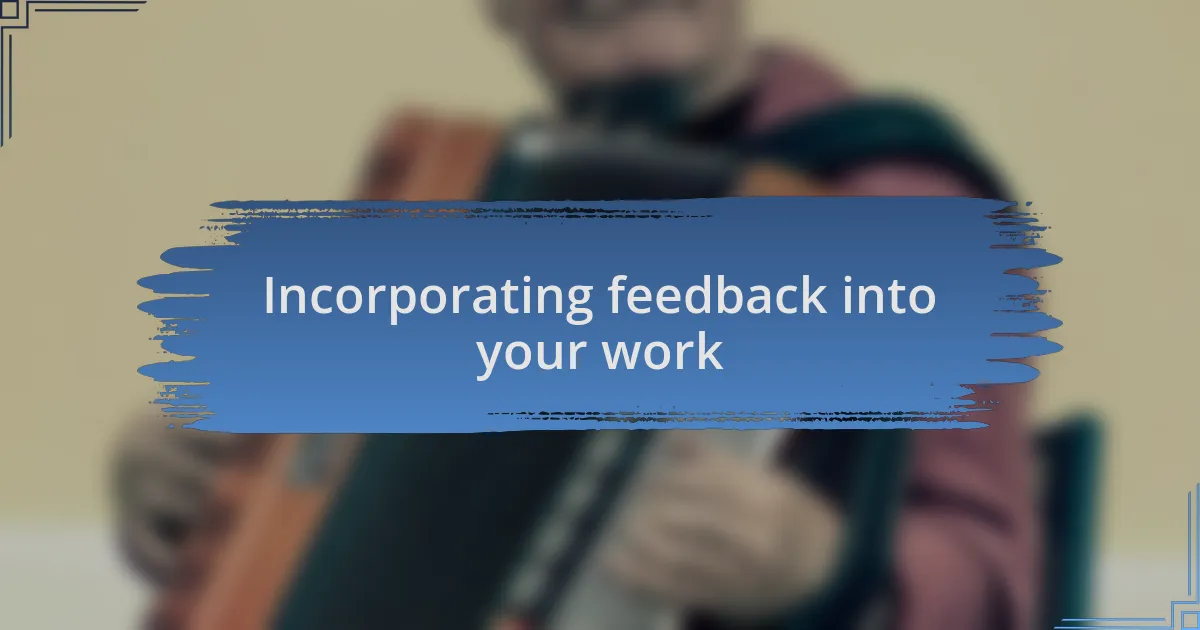
Incorporating feedback into your work
Incorporating feedback into my work often feels like piecing together a jigsaw puzzle. I remember a time when after a particularly rough critique, I let myself feel the sting of disappointment. Instead of pushing those feelings aside, I embraced them and used them as motivation. I carefully integrated the suggestions into my next song, watching the melody transform right before my eyes. Have you ever noticed how a single insightful comment can shift your entire approach?
It’s striking how feedback can reveal blind spots. I recall sharing a song I was proud of, only to hear that it lacked emotional impact. Chipping away at that initial frustration led me to re-evaluate not just the lyrics, but the overall narrative arc of the song. I couldn’t help but wonder: what if I rewrote the emotional climax from a different perspective? That simple shift resulted in a piece that resonated far more deeply with listeners.
When I incorporate feedback, I often document my thought process. After receiving notes on my production choices, I created a chart mapping each suggestion to possible revisions. This tangible representation allowed me to track my progress and remind me that every piece of feedback is an opportunity for collaboration, even if it sometimes feels uncomfortable. Have you tried documenting feedback? It could turn your processing into a more structured and rewarding experience.
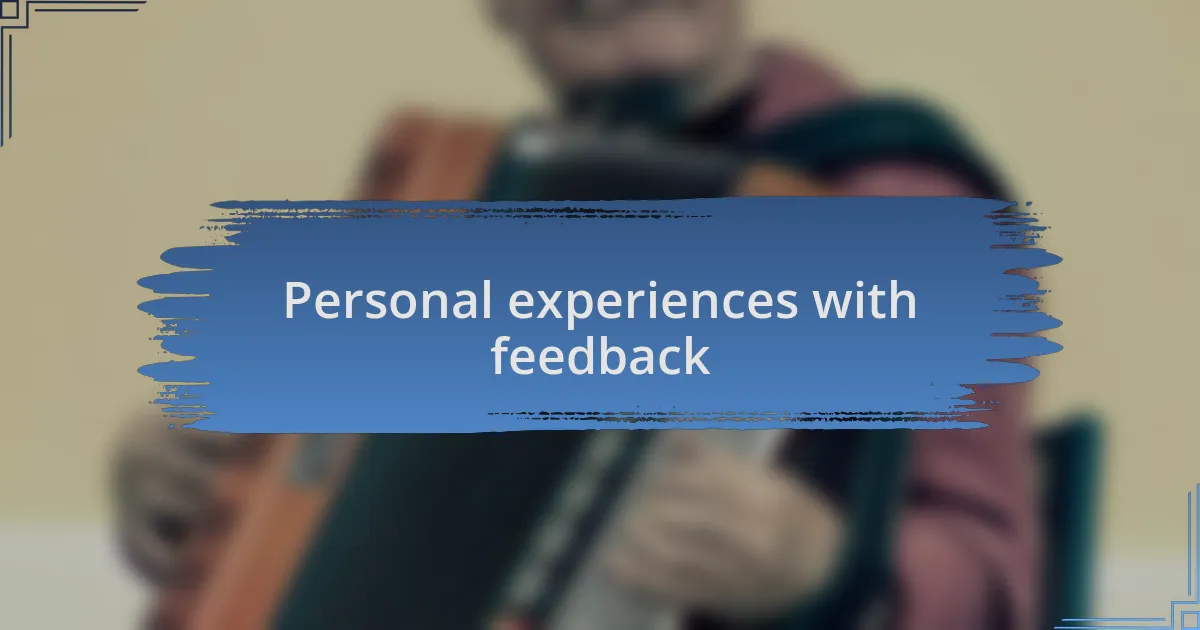
Personal experiences with feedback
Reflecting on past feedback, I remember the first time I shared my work with a mentor. Their suggestions felt overwhelming at first, and I hesitated—did I really want to hear what they had to say? But as I sat with their feedback, I realized it opened up doors I hadn’t even considered, which ultimately helped me develop my unique voice.
There was another instance when I emailed a group of fellow songwriters for their thoughts on a new melody. What struck me was how each response mirrored different perspectives; while one found the chorus too repetitive, another loved its simplicity. It got me thinking: isn’t it fascinating how subjective art can be? This variability in interpretation not only encouraged me to refine my work but also deepened my appreciation for diverse viewpoints.
I’ve also learned the value of following up after receiving feedback. Once, after making revisions based on listeners’ comments, I reached out to a few people to see how they felt about the changes. Their responses not only validated my choices but also sparked new ideas for future projects. Have you ever followed up on feedback? I find that ongoing conversations can elevate my creative process in ways I never anticipated.